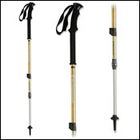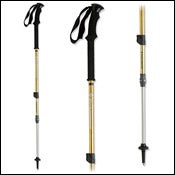Eh, another victim of running. I聮m increasingly convinced that running is inherently bad for you, regardless of how often you change your shoes, watch your stride, stay off concrete, etc. I love running聮s low equipment factor and the notion that you can get in a good workout in an hour or less. But your knees pay the price.
Black Diamond Contour Trekking Poles
 Black Diamond Contour Trekking Poles
Black Diamond Contour Trekking PolesAnyway, that聮s an editorial aside, spoken by a reformed (meaning, former) marathoner.
Otherwise, yeah, I聮m a HUGE proponent of trekking poles. In my mind there is no downside聴they reduce shock to knees and ankles, help with balance, create a natural hiking rhythm, and more. I don聮t go on any trail without poles, almost regardless of the load.
These days, there are two main decisions when buying poles. The first is whether to get two-section or three-section poles. Three-section poles collapse to a smaller size, which can be handy when traveling or when you don聮t want half-pole lengths sticking out of your pack. But they also add another joint, so have a slightly higher chance of mechanical failure while offering slightly less structural strength than two-section poles. To me it聮s sort of a matter of personal preference, and today, three-section poles are most common.
The other main choice is whether to get aluminum alloy or carbon fiber poles. Carbon costs more but I聮m completely behind it. Poles made with carbon seem weightless, the stuff is extremely strong, and carbon聮s natural ability to flex renders unnecessary add-ons such as built-in shock absorbers.
A classic pair of three-section aluminum poles would be Black Diamond聮s Contour Trekking Poles ($100; bdel.com). These have excellent grips with 15-degree angles for natural hand position, easy-to-manipulate adjustment locks, and low-profile trekking baskets that don聮t snag easily on underbrush. If you聮re less than five feet, eight inches in height, then try the Compact version ($80). Leki聮s Tour Ergosoft poles ($80; leki.com) are another excellent example of a three-section, aluminum-shaft trekking pole. Leki聮s handles aren聮t angled to quite the degree as Black Diamond聮s, and you might find the difference to your advantage.
REI聮s Peak UL Carbon Compact Trekking Poles ($130; rei.com) are an excellent buy in poles made with this material. I聮ve been using a pair this summer and really like them. They聮re incredibly light (11.2 ounces per pair), seem very strong, and have a nice balance of flex and stiffness. I聮ve had occasional problems getting the shafts to lock, but once they聮re tightened, they stay put. It may be an operator-error issue. Leki聮s Ultralite Carbon SLS Trekking Poles offer a higher-priced alternative at $200. That聮s pretty steep for a pair of glorified walking sticks, but they聮re light, tough poles.
Rim-to-rim is a big hike. Hope it goes well!
You聮ve seen our picks for 2007 Gear of the Year, and now the entire
国产吃瓜黑料 Summer Buyer聮s Guide is online. Check out this year聮s more than 400 must-have gear items, including trekking poles.


